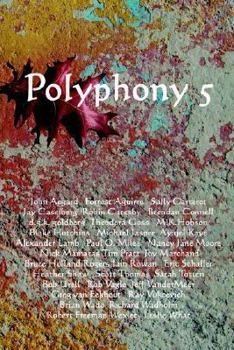Book Overview
No Synopsis Available.
Format:Paperback
Language:English
ISBN:0975590359
ISBN13:9780975590355
Release Date:August 2005
Publisher:Wheatland Press
Length:432 Pages
Weight:1.39 lbs.
Dimensions:1.0" x 6.0" x 9.0"
Related Subjects
Anthologies Anthologies & Literary Collections Fiction General Literature & Fiction PoetryCustomer Reviews
1 rating
Labor of love slipstream anthology
Published by Thriftbooks.com User , 14 years ago
This is the fifth in a series of short slipstream works (no other volume of which I've read). It is similar to the `best of' collection from _Lady Churchill's Rosebud Wristlet_. (I bought them at the same World Fantasy Convention two years ago, so maybe it was something in the air at the time.) Like the other collection, the two most striking features are (a) the exuberant range of writings and (b) the uniformly high quality. The idea behind the Polyphony series, insofar as I can figure it out because the book doesn't have a word of editorial comment, is to try to get as broad a range of stories as possible under one cover. At this, it succeeds. The thirty-one stories, while limited to a PG to PG-13 level of violence, sex and controversy, are all over the place. If they have anything in common, it's that a fair number are set in the modern United States and that they all have some kind of fantastical twist or conceit. In a few cases, it seems like a predominantly fantasy writer tossed in a little spice out of fear of being accused of being a realist. In fact, the fantastic in Rick Wadholm's `The hottest night of the summer' could be dismissed by a materialist as simply a coincidence. (But this story of a gas station attendant sticks with me, perhaps because I'm starting to feel a nostalgic anti-nostalgia for the 1980s in a way similar to the author's interest in the 1970s.) John Aegard's `Dwelling' is about a love triangle that doesn't need to be a post-earthquake Seattle ghost story. But generally speaking, there is something in defiance of physics or history that's central to each story. The opener, Heather Shaw's very funny `Single White Farmhouse' about the hazards of online dating for a New England house, would lose everything if it were about a single white woman. A few stories are set in undisclosed fairyland worlds, like Jeff VanderMeer's `The Farmer's Cat' about a farmer who has trouble with trolls. Full-blown otherworldly science fiction is rare. The most notable example is Alexander Lamb's `Ithrulene' that starts off as a futuristic rehash of a `ordinary American vs. Third World terrorists' movie but evolves into something considerably stranger, though Scott Thomas's `The Bone Ship' about an almost retro-1940s fantasy war is noteworthy as the one truly haunting piece. A few stories probably technically don't deserve to be called stories as such but are pretty funny: Nick Mamatas's `To-do list' and Bruce Holland Rogers's `Story Stories' (which begins "Some readers doubted that the story was a story at all. `It's too short. It lacks characters,' some said."). And these stories are _good_. I find it difficult to subscribe to short story magazines because I rarely find one story per issue that I genuinely like. This collection maintains very high standards throughout. There are maybe a couple of stories that stoop to being average (and they're generally pretty short). It's easy to imagine that some brilliant upcoming writer twenty year






